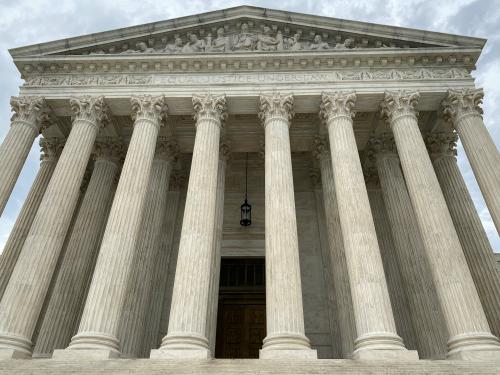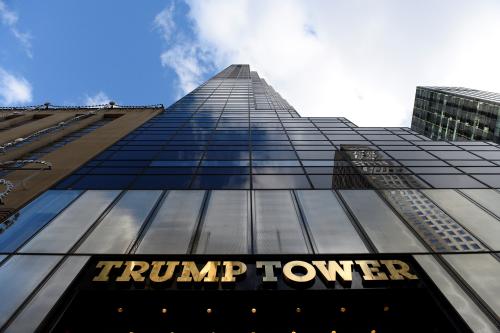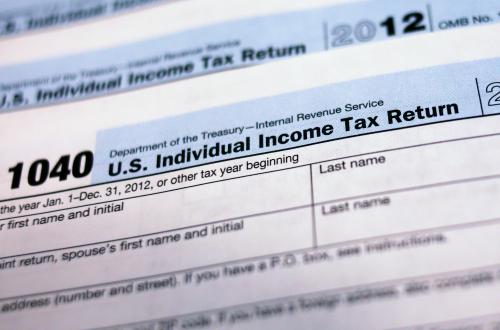Earlier this month the Supreme Court heard three cases dealing with subpoenas seeking information about President Trump’s businesses and financial activities, including records of his tax returns. The subpoenas were served not on President Trump, but on two banks and an accounting firm that were custodians of the subpoenaed records. The Supreme Court agreed to hear, and has now heard, Trump’s appeals from earlier court actions.
The cases are Trump v. Mazars USA, LLP (the accounting firm) consolidated with Trump v. Deutsche Bank AG and Trump v. Vance. Mazars and its companion bank cases (henceforth Mazars) involve four subpoenas issued by three House Committees: the House Financial Services Committee, the House Intelligence Committee and the House Oversight Committee. Vance involves a subpoena in aid of a grand jury investigation served on behalf of Cyrus Vance, the District Attorney for the County of New York, on Trump’s accounting firm (Mazars) seeking the same documents the House committees requested.
However, except for issues relating to unduly burdening the executive, Mazars and Vance are distinct in the issues they present and the precedents that most directly bear on them. They also differ in that Trump’s immediate risk in Mazars is almost entirely political since the information sought could affect voters’ views of him. In Vance, however, there is at least some risk that the information sought might support a criminal indictment. However, President Trump is almost certainly immune from trial until after his term in office has ended, and the question of whether a sitting president can be indicted has never been answered. Grand jury secrecy should mean that any documents turned over to Vance will not come back to haunt Trump politically, but as one justice pointed out in oral argument, leaks from grand jury proceedings have happened.
A more interesting difference between the two cases is that Trump could prevail in Mazars without benefitting from being the country’s president, but in Vance Trump’s status as president is at the heart of his case. The case for Trump’s position in Mazars is stronger than it is in Vance, and the constitutional issues Mazars raises are more complex and interesting than those posed by Vance. For this reason the discussion that follows focuses largely on Mazars and its clash between Congress and the president.
Are the requests a valid exercise of congressional power?
The question at the heart of Mazars is whether the subpoenas issued by the House committee are a valid exercise of congressional power. Following a principle enunciated first as dicta (commentary not essential to a decision) in Kilbourn v. Thompson [105 U.S. 168 (1880)] and reaffirmed several times since, Congress may use its investigative powers, including both subpoenas and the ability to call and examine witnesses, only in aid of a legislative function. It may not investigate solely to expose embarrassing or illegal behavior or to gather evidence that might be used in a legal proceeding. Any governmental power to investigate with these ends as goals is impermissible. Justice Brennan put the matter this way: “Investigation conducted solely to … punish the investigated, either by publicity or prosecution, is indefensible—it exceeds the congressional power: exposure for the sake of exposure is not legislative inquiry.” Hutchinson v. U.S. [369 U.S. 599, 624 (1962)
Applying this principle, Trump appears to have a strong case. His brief makes a fair point at its outset when it calls attention to House Democrats delightfully discussing the investigations that their 2018 takeover of the House will enable. Moreover, the House had no reason to think its investigations of Trump would result in new laws, since the chance that the Senate would pass any legislation growing out of these investigations seemed and seems virtually nil.
The Supreme Court is, however, seldom an empirical factfinder, nor does it purport to be. It regularly escapes difficulties caused by inconvenient facts or disguises politically motivated decisions by indulging in fictions or making assumptions that are not obviously true and in some cases are clearly false. The escape valve on the legislative subpoena issue opened early. In McGrain v. Dougherty, [273 U.S. 135 (1927) the Court affirmed the Kilbourn dicta on the limits of Congress’s investigative power as binding law, but went on to quote with approval language from a New York Court of Appeals opinion which declared, “[w]e are bound to presume that the action of the legislative body was with a legislative object, if it is capable of being so construed.” This was reaffirmed thirty-two years later in Barenblatt v. United States [360 U.S. 109 (1959)], another case testing the limits of Congress’s subpoena power. In Barenblatt the Court quoted with approval language asserting that “So long as the Congress acts in pursuance of its constitutional powers, the Judiciary lacks authority to intervene on the basis of motives which spurred the exercise of that power.”
Established case law is thus consistent with three propositions: (1) Congress cannot use its investigative powers for purposes unrelated to its legislative function. (2) Courts should begin with the assumption that a Congressional subpoena meets the legislative nexus test. (3) The assumption of proper purpose may not be rebutted by examining the motives behind the Congressional demand for information. In practice, with one qualification, these principles have meant that if the information Congress seeks might properly inform a matter on which Congress has the power to legislate, the demand will be upheld. The qualification is that a committee issuing a subpoena or asking a question must have the authority to legislate on the particular matter it is inquiring into. In the McCarthy period, for example, some contempt of Congress convictions for refusing to answer committee questions were reversed because regardless of whether the question’s answer might have informed possible legislation, it could not inform legislation the committee was authorized to recommend
What this means for Trump is that although his case is empirically strong, if the Court hews to precedent on the legislative powers issue, he is fighting an uphill battle. Even without well-established precedent, when it comes to examining Congress’s motives, courts don’t want to go there. Compared to investigating a congressional committee’s motives, the test of whether a congressional inquiry might inform legislation is an easy one to apply. Moreover, the Court’s more conservative justices have regularly blinded themselves to motive in assessing the constitutionality of state laws, particularly law relating to voting and civil rights. The more conservative justices have, for example, accepted asserted desires to prevent voter fraud as adequate legislative justifications for voter I.D. laws, ignoring overwhelming evidence that in-person voter fraud is so rare as to be almost non-existent, that I.D. laws are likely to disadvantage many minority voters, and that some indiscreet legislators have said as much in advocating for I.D. legislation.
Trump’s counsel have sought to push back against the precedents summarized above. Their brief quotes cases suggesting that the Court should not blind itself to what everyone can see, seeking to give sympathetic justices language to hang onto. To this end, Trump’s counsel posited a difficult-to-understand distinction between the motives for the subpoenas, which a court could not examine, and the subpoenas’ purposes which could be reviewed. The logic behind this distinction, as near as I can understand it, is that if committee members who voted for the subpoenas were motivated by a desire to gather information that might harm Trump politically, the subpoenas would nonetheless be valid so long as the information sought might possibly inform legislation. If, on the other hand, the goal of the subpoenas was to harm Trump politically, then even if the records sought might inform legislation, the subpoenas should be quashed. The argument is that although the Court cannot examine motives, it can examine goals. But how one can discern the purpose of a subpoena without reaching conclusions about the motives that led to its issuance is beyond me, and should be beyond the justices as well.
Are the requests unduly burdensome on the president?
To reinforce their legislative subpoena argument and as an independent ground for decision, Trump’s counsel also argued that whatever the general rule regarding congressional subpoenas, when subpoenas seek records related to a president the Constitution’s separation of powers and the need to avoid unduly burdening the executive gives the president privileges that ordinary litigants do not enjoy. According to the president’s counsel and the United States as amicus, not only must it be indisputably true that a committee seeking to acquire a president’s personal or business-related related records is authorized to do so, but also if a subpoena is likely to interfere substantially with the chief executive’s Article II responsibilities, it should not issue. In oral argument, Trump’s counsel told the Court, “Unlike Congress, the President is never in recess,” and later it was noted as an obvious truth that the executive must be able “to discharge his duties 24 hours a day,” a position hit even harder in Vance, where it forms the core of the president’s defense.
By Trump’s suggested test, it would appear that Congress could never subpoena a sitting president’s records because there is no time when dealing with a subpoena might not distract him from presidential duties. Here, however, it is the president who seeks to take advantage of a fiction. By all reports President Trump spends hours each morning watching Fox News, and he seems to have set a record for presidential time spent in a single term on the golf course. Surely President Trump has the time to both discharge his responsibilities as president and deal with matters raised by subpoenas for documents that he is not even being asked personally to produce.
Are there any limits on Congress’s power to investigate?
Perhaps although not necessarily because of the president’s special status, some justices, and not just the conservatives, seem concerned with abuses that a refusal to look at motives might allow. In oral argument, several justices pressed House counsel on whether there were any areas where Congress might not legislate and hence any areas where the Congress, under the guise of seeking to inform itself as an aid to legislation, might not launch investigations solely to “prosecute” people, either by revealing crime, as a grand jury investigation might, or by embarrassment in the court of public opinion. House counsel had difficulty responding to the justices’ queries. Those asking these questions were seeking some principle that could limit the reach of the legislative power, but counsel offered no examples of places where the Congress could not go, simply suggesting that the courts could prevent abuse.
His response might have been stronger had he pivoted from the literal meaning of the question and addressed its underlying concern—which was whether a decision to uphold the subpoenas would mean there were no limits on Congress’s power to investigate. Although, as House counsel intimated, there may be no subject on which Congress could not legislate, this does not mean that Congress’s investigative powers are unconstrained. They were in fact constrained in Kilbourn, the font of precedent in this area, and have been constrained in several cases since. A powerful reply might have drawn on the record in this case. Although the 2nd Circuit generally upheld the subpoenas issued to the two banks in the case consolidated with Mazars, it remanded the case to the district court to deny requests for certain material that it felt had no relevance to the investigating committees’ legislative mandates. House counsel, thus, had at hand specific examples of how congressional inquiry was constrained, did not think to use them.
Are the requests without precedent?
There are some arguments made by Trump’s counsel that ought to be dismissed. One is that the House committees’ attempts to subpoena the kinds of presidential records sought in this case are without precedent, the implication being that if the Congress had the power to do so, it would have done so by now. Not only does the House dispute this argument from history, but also it points to instances where presidents have voluntarily turned over papers despite initial claims that they could keep their papers private. That other presidents have obviated the need for subpoenas by eventually acceding to congressional demands does not mean the House cannot subpoena presidential documents when the executive will not comply.
Are the requests a mere case study designed to discredit Trump politically?
Trump’s counsel also pounced on the suggestion that the House can legitimately focus on Trump’s financial and business affairs as a “case study.” They see this singling out of Trump as proof that the House’s only reason for seeking Trump-related documents is to discredit him politically. It appears some justices may see things in the same light. Should this happen, the House has only itself to blame. No presidency has posed a situation where a chief executive’s private business and official lives have been so complex and potentially intertwined. For a committee like the House Oversight Committee, which is concerned with ethics in government, understanding Trump’s situation is needed to inform legislation because there is to date no equivalent case to observe. The House could have given a mandate to its committee that made clear the legislative relevance of a Trump case study, such as the need to explore whether legislation is needed to ensure that a president does not unduly profit from money paid to properties he owns.
The House could similarly have dressed up its mandates to other committees to highlight the relevance of Trump’s records to legislation the committee might recommend. Highlighting valid reasons for the subpoenas is not, however, the same as stating true reasons. Trump’s argument that the House subpoenas are invalid because they seek information solely to embarrass or punish him is not disproved by the fact that the subpoenas could have been issued for legitimate legislative purposes. But for the fiction that subpoenas are issued for a proper purpose if what they seek might possibly inform legislation, Trump could make out a plausible case that the House’s motive for seeking his private records was entirely political and so passed the bounds of what the Constitution allows Congress to do. Some justices may feel this way. Whether or not they decide on these grounds, the perception may influence their votes.
Are the committees seeking Trump’s records properly authorized by House rules?
Even if Trump does not prevail on the legislative purpose or undue burden arguments, he could succeed on another claim: that the committees seeking Trump’s records were not authorized by House rules do so. This argument reflects Trump’s position that before a president’s records can be subpoenaed, it must be clear that the committee issuing the subpoena was authorized by House rules to do so, and that the president’s status is such that the default assumption should be that unless such authority is specifically conveyed by the rules governing a committee, it does not exist. In this case nothing about the House rules establishing each committee’s jurisdiction or the grant of subpoena power in aid of that jurisdiction specifically authorizes subpoenas directed at the president or at custodians of the president’s records.
The House rejects these claims, asserting that the general subpoena power it granted each of its committees was always intended to encompass subpoenas directed at presidential records. To make this clear, after Trump’s attorneys took this position in the district courts hearing the president’s objections to the subpoenas, the House passed a resolution ratifying the subpoenas its committees had issued and affirming that under its rules the power to subpoena the president’s records was always part of the general subpoena power it accorded each of its committees. The resolution went on to describe specifically the kinds of inquiries regarding the president and the White House that it claimed its committees had always been authorized to make. The president’s lawyers nevertheless sought to reframe the House resolution as a change in its committees’ authorizations, and they argued that the House could not post hoc cure defects in the powers the House rules gave its committees at the time they issued their subpoenas.
Although Trump’s argument is dubious at best, it could turn out to be the argument on which a Trump wins the case. Not only does a decision on the suggested grounds avoid more difficult constitutional issues, but it also means the Court will be able to avoid questioning the motives behind the subpoenas at issue in this case while not reaffirming the notion that motives can never be examined. There is precedent for this approach. The Court used it to avoid addressing the constitutional permissibility of a legislative subpoena in United States v. Rumely [345 U.S. 41 (1953)]. Justice Frankfurter, writing for the Court, extolled the virtues of choosing this non-constitutional route to decision. Moreover, in celebrated cases where a president’s immunity from process has been at issue, the Court has sought to render decisions that all justices could agree on. This may not be possible in Mazars, but it may be that more justices would join an opinion holding the House rules did not authorize the committee’s subpoenas than would join in a decision for Trump that rested on any other basis.
Delay favors Trump
Finally, it is possible if not likely that even if Trump loses, he wins. Trump’s greatest concern is keeping secret information that might harm his chance of re-election. The Court could issue an opinion which generally upholds the legality of the subpoenas but remands the cases for resolution of some minor matters, or even, as Judge Debra Livingston suggested dissenting in part from the 2nd Circuit’s judgment in Mazars, for specific statements of why each set of documents sought was needed to inform possible legislation. Before the remand and appeals from the district court’s judgment were complete, the election would long since be over, and with the seating of a new House the subpoenas issued by this House’s committees would have lapsed. The president’s attorneys know this.
Trump’s position in Vance is considerably weaker than his position in Mazars. Trump’s attorneys recognize this and have a fallback position. Both at the beginning and the end of their reply brief in Vance, they make a poorly disguised argument for delay. (“In all events, the Court should not affirm on a case-specific basis without affording the President the opportunity to develop a factual record,” and, “basic fairness [and respect for the presidency] warrant giving the Chief Executive a chance to develop a factual record should … a case-specific showing [be] needed to successfully challenge this subpoena.” ) Vance’s counsel did his client no favors at oral argument on this score. At first, citing cases like Clinton v. Jones, he argued effectively for the proposition that allowing Vance to acquire the material he sought would not unduly burden the executive, but near the conclusion of his argument, he engaged in colloquies with several justices in which he seemingly conceded that one could assume that a third-party subpoena for a president’s personal records would burden the executive, perhaps to the extent that the subpoena would have to be quashed. He disputed Trump’s lawyers’ claim that they had been denied the possibility of raising relevant factual claims when they first contested the subpoenas in the district court, and he also argued that a sealed submission to the district court met whatever need-to-know standards might exist when a president’s records were sought. But resolving these disputes might itself require a remand.
Even though in either case the Supreme Court could uphold the subpoenas and give them immediate effect, it is more likely that Trump will get what he most wants—not necessarily winning both cases but maintaining the secrecy of his tax and financial records until after the election.
The Brookings Institution is committed to quality, independence, and impact.
We are supported by a diverse array of funders. In line with our values and policies, each Brookings publication represents the sole views of its author(s).








Commentary
Trump’s tax returns: The legal issues and possible outcomes
May 28, 2020